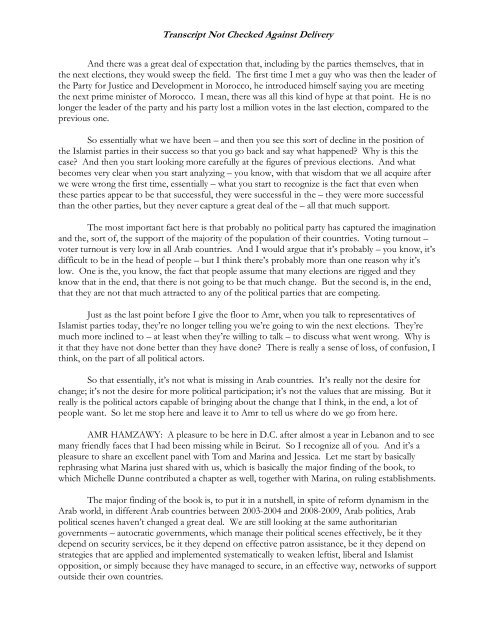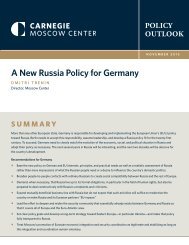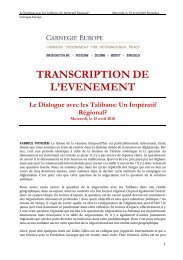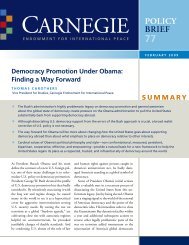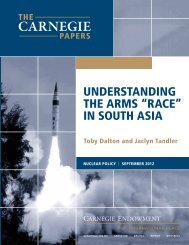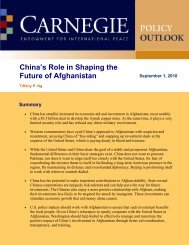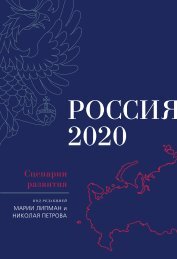getting to pluralism: political actors in the arab world - Carnegie ...
getting to pluralism: political actors in the arab world - Carnegie ...
getting to pluralism: political actors in the arab world - Carnegie ...
Create successful ePaper yourself
Turn your PDF publications into a flip-book with our unique Google optimized e-Paper software.
Transcript Not Checked Aga<strong>in</strong>st Delivery<br />
And <strong>the</strong>re was a great deal of expectation that, <strong>in</strong>clud<strong>in</strong>g by <strong>the</strong> parties <strong>the</strong>mselves, that <strong>in</strong><br />
<strong>the</strong> next elections, <strong>the</strong>y would sweep <strong>the</strong> field. The first time I met a guy who was <strong>the</strong>n <strong>the</strong> leader of<br />
<strong>the</strong> Party for Justice and Development <strong>in</strong> Morocco, he <strong>in</strong>troduced himself say<strong>in</strong>g you are meet<strong>in</strong>g<br />
<strong>the</strong> next prime m<strong>in</strong>ister of Morocco. I mean, <strong>the</strong>re was all this k<strong>in</strong>d of hype at that po<strong>in</strong>t. He is no<br />
longer <strong>the</strong> leader of <strong>the</strong> party and his party lost a million votes <strong>in</strong> <strong>the</strong> last election, compared <strong>to</strong> <strong>the</strong><br />
previous one.<br />
So essentially what we have been – and <strong>the</strong>n you see this sort of decl<strong>in</strong>e <strong>in</strong> <strong>the</strong> position of<br />
<strong>the</strong> Islamist parties <strong>in</strong> <strong>the</strong>ir success so that you go back and say what happened? Why is this <strong>the</strong><br />
case? And <strong>the</strong>n you start look<strong>in</strong>g more carefully at <strong>the</strong> figures of previous elections. And what<br />
becomes very clear when you start analyz<strong>in</strong>g – you know, with that wisdom that we all acquire after<br />
we were wrong <strong>the</strong> first time, essentially – what you start <strong>to</strong> recognize is <strong>the</strong> fact that even when<br />
<strong>the</strong>se parties appear <strong>to</strong> be that successful, <strong>the</strong>y were successful <strong>in</strong> <strong>the</strong> – <strong>the</strong>y were more successful<br />
than <strong>the</strong> o<strong>the</strong>r parties, but <strong>the</strong>y never capture a great deal of <strong>the</strong> – all that much support.<br />
The most important fact here is that probably no <strong>political</strong> party has captured <strong>the</strong> imag<strong>in</strong>ation<br />
and <strong>the</strong>, sort of, <strong>the</strong> support of <strong>the</strong> majority of <strong>the</strong> population of <strong>the</strong>ir countries. Vot<strong>in</strong>g turnout –<br />
voter turnout is very low <strong>in</strong> all Arab countries. And I would argue that it’s probably – you know, it’s<br />
difficult <strong>to</strong> be <strong>in</strong> <strong>the</strong> head of people – but I th<strong>in</strong>k <strong>the</strong>re’s probably more than one reason why it’s<br />
low. One is <strong>the</strong>, you know, <strong>the</strong> fact that people assume that many elections are rigged and <strong>the</strong>y<br />
know that <strong>in</strong> <strong>the</strong> end, that <strong>the</strong>re is not go<strong>in</strong>g <strong>to</strong> be that much change. But <strong>the</strong> second is, <strong>in</strong> <strong>the</strong> end,<br />
that <strong>the</strong>y are not that much attracted <strong>to</strong> any of <strong>the</strong> <strong>political</strong> parties that are compet<strong>in</strong>g.<br />
Just as <strong>the</strong> last po<strong>in</strong>t before I give <strong>the</strong> floor <strong>to</strong> Amr, when you talk <strong>to</strong> representatives of<br />
Islamist parties <strong>to</strong>day, <strong>the</strong>y’re no longer tell<strong>in</strong>g you we’re go<strong>in</strong>g <strong>to</strong> w<strong>in</strong> <strong>the</strong> next elections. They’re<br />
much more <strong>in</strong>cl<strong>in</strong>ed <strong>to</strong> – at least when <strong>the</strong>y’re will<strong>in</strong>g <strong>to</strong> talk – <strong>to</strong> discuss what went wrong. Why is<br />
it that <strong>the</strong>y have not done better than <strong>the</strong>y have done? There is really a sense of loss, of confusion, I<br />
th<strong>in</strong>k, on <strong>the</strong> part of all <strong>political</strong> ac<strong>to</strong>rs.<br />
So that essentially, it’s not what is miss<strong>in</strong>g <strong>in</strong> Arab countries. It’s really not <strong>the</strong> desire for<br />
change; it’s not <strong>the</strong> desire for more <strong>political</strong> participation; it’s not <strong>the</strong> values that are miss<strong>in</strong>g. But it<br />
really is <strong>the</strong> <strong>political</strong> ac<strong>to</strong>rs capable of br<strong>in</strong>g<strong>in</strong>g about <strong>the</strong> change that I th<strong>in</strong>k, <strong>in</strong> <strong>the</strong> end, a lot of<br />
people want. So let me s<strong>to</strong>p here and leave it <strong>to</strong> Amr <strong>to</strong> tell us where do we go from here.<br />
AMR HAMZAWY: A pleasure <strong>to</strong> be here <strong>in</strong> D.C. after almost a year <strong>in</strong> Lebanon and <strong>to</strong> see<br />
many friendly faces that I had been miss<strong>in</strong>g while <strong>in</strong> Beirut. So I recognize all of you. And it’s a<br />
pleasure <strong>to</strong> share an excellent panel with Tom and Mar<strong>in</strong>a and Jessica. Let me start by basically<br />
rephras<strong>in</strong>g what Mar<strong>in</strong>a just shared with us, which is basically <strong>the</strong> major f<strong>in</strong>d<strong>in</strong>g of <strong>the</strong> book, <strong>to</strong><br />
which Michelle Dunne contributed a chapter as well, <strong>to</strong>ge<strong>the</strong>r with Mar<strong>in</strong>a, on rul<strong>in</strong>g establishments.<br />
The major f<strong>in</strong>d<strong>in</strong>g of <strong>the</strong> book is, <strong>to</strong> put it <strong>in</strong> a nutshell, <strong>in</strong> spite of reform dynamism <strong>in</strong> <strong>the</strong><br />
Arab <strong>world</strong>, <strong>in</strong> different Arab countries between 2003-2004 and 2008-2009, Arab politics, Arab<br />
<strong>political</strong> scenes haven’t changed a great deal. We are still look<strong>in</strong>g at <strong>the</strong> same authoritarian<br />
governments – au<strong>to</strong>cratic governments, which manage <strong>the</strong>ir <strong>political</strong> scenes effectively, be it <strong>the</strong>y<br />
depend on security services, be it <strong>the</strong>y depend on effective patron assistance, be it <strong>the</strong>y depend on<br />
strategies that are applied and implemented systematically <strong>to</strong> weaken leftist, liberal and Islamist<br />
opposition, or simply because <strong>the</strong>y have managed <strong>to</strong> secure, <strong>in</strong> an effective way, networks of support<br />
outside <strong>the</strong>ir own countries.


